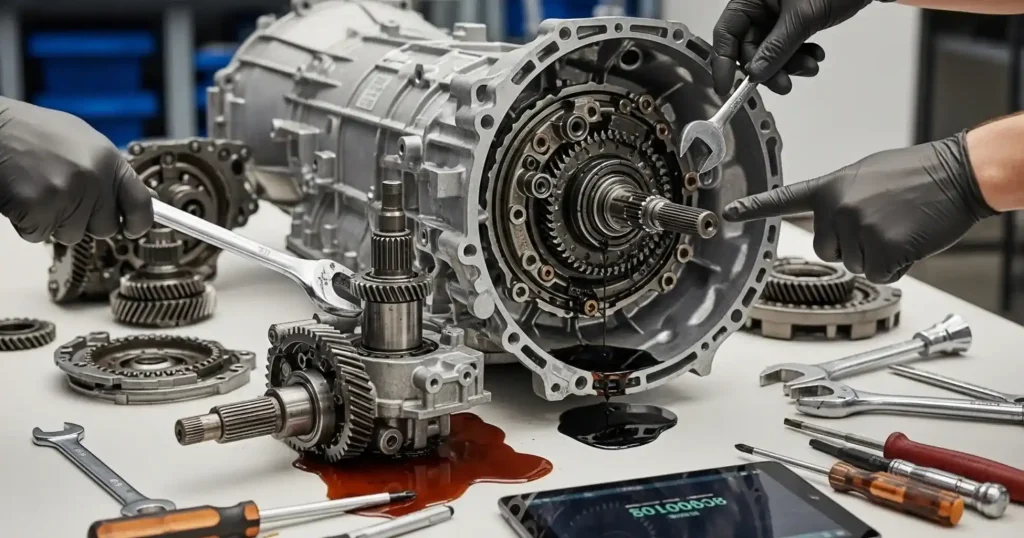BMW cars are known for their smooth drive and strong performance. But even these well-built machines can run into trouble, especially with the transmission. Some common BMW transmission problems include hard shifting, slipping gears, delayed response, or warning lights on the dashboard. These issues can be caused by low fluid, worn parts, or problems with the gearbox computer.
This guide will help you understand the warning signs, what causes transmission problems, and how to fix or prevent them before they turn into expensive repairs.
Common Warning Signs of BMW Transmission Problems
It’s important to catch problems early. Here are signs your BMW transmission may need attention:
1. Delayed Gear Engagement
If there’s a delay when you shift from Park to Drive or Reverse, the transmission may not be responding correctly. This is often a fluid or computer issue.
2. Slipping Gears
Your BMW may suddenly change gears without reason or feel like it has lost power. This can be dangerous and usually points to worn clutches or low transmission fluid.
3. Hard or Rough Shifting
If the car jerks or makes clunking sounds when changing gears, something inside the gearbox may be damaged or out of sync.
4. Transmission Warning Light
Many BMWs will show a gear symbol or “Transmission Malfunction” on the dashboard. Don’t ignore this. It means the system has found an error.
5. Unusual Noises
Humming, whining, or grinding sounds while driving can mean parts inside the gearbox are wearing out.
Causes of BMW Transmission Problems
BMW gearboxes are complex and rely on both mechanical and electronic parts. These are the most common causes of transmission trouble:
1. Low or Dirty Transmission Fluid
This is the #1 reason behind most gearbox issues. Fluid keeps parts cool and helps with smooth shifting. If the transmission is leaking, low or dirty, it can lead to overheating and damage.
2. Faulty Mechatronic Unit
BMW automatic transmissions use a part called a mechatronic unit, which controls shifting. If this part fails, gear changes can become rough or stop completely.
3. Worn Clutches or Bands
These parts control gear shifts. When they wear out, the gearbox may slip, get stuck in gear, or shift late.
4. Software Issues
Newer BMWs use software to control the gearbox. Sometimes, a bug or outdated software can cause shifting problems.
5. Driving Habits and Overheating
Aggressive driving, towing heavy loads, or driving in very hot weather without enough fluid can overheat and damage the transmission.
How to Fix BMW Transmission Problems
Fixes depend on what’s causing the issue. Here are the most common transmission repair options:
1. Transmission Fluid Change
If the fluid is old or dirty, a fluid change or flush can often fix slipping or hard shifting. Make sure to use BMW-approved transmission fluid only.
2. Software Update or Reset
If the problem is caused by software, a reset or update may fix the issue. This can be done at a BMW service center.
3. Replace or Repair Mechatronic Unit
If the shifting control unit is failing, it may need to be replaced. This is a common fix in many BMW models.
4. Replace Worn Parts
Clutches, bands, and seals can wear out over time. A rebuild or replacement of these parts may be needed for older cars.
5. Full Transmission Replacement
In rare cases, if the gearbox is fully damaged, the whole transmission may need to be replaced. This is the most expensive repair.
How to Prevent Transmission Problems in Your BMW
Good habits and regular service can keep your BMW’s transmission healthy:
- Check and change transmission fluid every 40,000 to 60,000 km
- Avoid aggressive driving, like quick acceleration or sudden stops
- Warm up your car before driving in cold weather
- Don’t ignore warning lights or rough gear changes
- Service your car at a trusted BMW center like Al Zaabi Autocare
These simple steps can add years to your gearbox’s life and save you from big repair bills.
Can You Drive With a Transmission Problem?
You might be able to drive short distances, but it’s not safe. If the transmission slips or shifts at the wrong time, it can lead to accidents. Driving with problems can also cause more damage and raise repair costs. If you notice anything unusual, get your car checked as soon as possible.
Conclusion
BMW cars are built for performance, but their transmissions still need care. Common BMW transmission problems include slipping, delayed shifting, and dashboard warnings. These issues are often caused by low fluid, software faults, or worn parts. Fixes can range from fluid changes to full part replacements.To avoid costly repairs, maintain your transmission, drive gently, and service your car regularly. If your BMW is showing signs of trouble, visit Al Zaabi Autocare today for expert diagnosis and car repairs.











